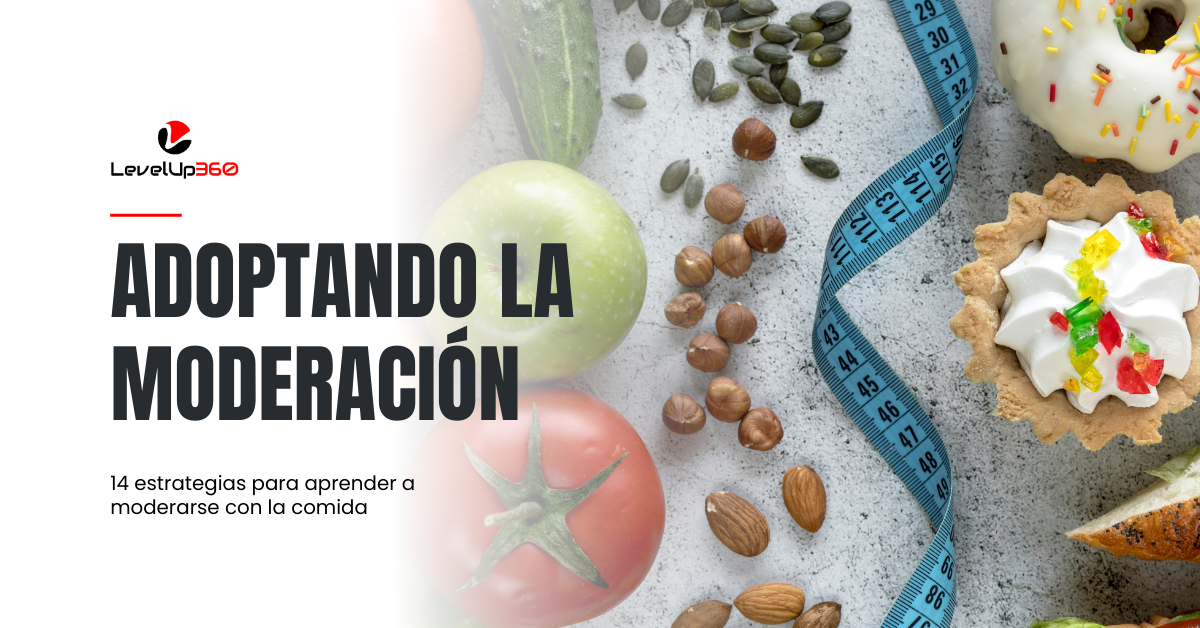
Embracing Moderation: 14 Strategies To Learn Moderation Around Food
In a world that often glorifies extreme diets and dramatic weight loss transformations, the concept of moderation might seem counterintuitive. We’re surrounded by messages that encourage us to cut out entire food groups, follow strict eating schedules, and label foods as either “good” or “bad.” This all-or-nothing approach to nutrition can create a harmful cycle of restriction, guilt, and overindulgence. But what if there’s a more balanced and sustainable way to approach our eating habits?
Extreme approaches to dieting can initially yield results, but they often come at a high cost. Strict diets that eliminate certain foods or severely restrict calories can lead to nutrient deficiencies, mood swings, and a preoccupation with food. Additionally, these approaches are usually difficult to maintain over the long term, often resulting in a cycle of yo-yo dieting where weight is repeatedly lost and regained.
Moderation is a mindset that challenges the black-and-white thinking surrounding food. Instead of classifying foods as good or bad, moderation encourages us to view food as a spectrum. Some foods offer more nutritional value, while others provide pleasure and enjoyment. Both have a place in a balanced diet. The key is learning to enjoy indulgent foods without going overboard and making nutrient-dense choices most of the time.
The benefits of adopting a moderation mindset extend far beyond just weight management. By learning to enjoy all foods in a balanced way, you’re fostering a positive relationship with eating that can last a lifetime. You’re also nourishing your body with a diverse range of nutrients, supporting your energy levels, and reducing the risk of nutrient deficiencies that extreme diets can often cause.
So, let’s go over some tactics that can help you learn moderation around food.
Strict diets that eliminate certain foods or severely restrict calories can lead to nutrient deficiencies, mood swings, and a preoccupation with food
1. Don’t Rely on Willpower
One of the biggest misconceptions about moderation is that it requires superhuman willpower. In reality, relying solely on willpower is an uphill battle. Willpower is a finite resource that can be depleted by stress, fatigue, and decision fatigue. Rather than relying on willpower to resist every temptation, it’s more effective to build an environment that supports your goals.
2. Find What Works for You
For many individuals, adopting a moderation mindset can help break the binge-and-restrict cycle. This cycle often starts with strict dieting or avoidance of certain foods. Over time, feelings of deprivation build up, leading to a loss of control and eventual overindulgence in the “forbidden” foods. This sets off a cycle of guilt and self-criticism, which then prompts a return to restrictive eating.
If you’ve spent years oscillating between strict diets and overindulgence, it’s likely that your brain has developed certain patterns and associations with food. The good news is that your brain is adaptable and can be rewired with consistent effort. Each time you make a moderate choice and avoid the extremes, you’re strengthening new neural pathways that support healthier habits.
3. Break the Binge-and-Restrict Cycle
For many individuals, adopting a moderation mindset can help break the binge-and-restrict cycle. This cycle often starts with strict dieting or avoidance of certain foods. Over time, feelings of deprivation build up, leading to a loss of control and eventual overindulgence in the “forbidden” foods. This sets off a cycle of guilt and self-criticism, which then prompts a return to restrictive eating.
If you’ve spent years oscillating between strict diets and overindulgence, it’s likely that your brain has developed certain patterns and associations with food. The good news is that your brain is adaptable and can be rewired with consistent effort. Each time you make a moderate choice and avoid the extremes, you’re strengthening new neural pathways that support healthier habits.
4. Understand Your Triggers
One of the first steps in embracing moderation is understanding your triggers. What situations or emotions prompt you to overeat or make unhealthy food choices? It could be stress, boredom, loneliness, or celebration. By identifying these triggers, you can develop strategies to cope with them that don’t involve turning to food. Engaging in a hobby, practicing deep breathing, or reaching out to a friend can all help you navigate these triggers in a healthier way.
Embracing moderation is a journey of self-discovery. As you practice moderation, you’ll learn valuable lessons about yourself, your preferences, and your body’s responses to different foods. This knowledge is empowering and can guide you toward making choices that support your well-being.
5. Create a Balanced Plate

Moderation isn’t just about how much you eat; it’s also about what you eat. Building balanced meals can help stabilize your energy levels, prevent overeating, and ensure you’re getting a variety of nutrients. Aim to fill half your plate with colourful vegetables and fruits, one-quarter with lean proteins like chicken, fish, or beans, and one-quarter with whole grains such as quinoa or brown rice.
6. Give Yourself Permission Enjoy
Giving yourself permission to enjoy your favourite foods is a crucial aspect of moderation. When you label foods as “bad” and deny yourself the pleasure of indulging in them, it can lead to cravings and overconsumption. Instead of completely avoiding your favourite treats, incorporate them into your diet in a mindful way. Savor each bite, eat slowly, and pay attention to how the food makes you feel.
7. Make Small, Gradual Changes
Embracing moderation doesn’t mean overhauling your entire lifestyle overnight. In fact, trying to make too many changes at once can be overwhelming and unsustainable. Instead, focus on making small, gradual changes. Swap sugary beverages for water, add an extra serving of vegetables to your meals, or choose whole-grain options instead of refined grains. These small changes might seem insignificant, but over time, they can add up to significant improvements in your health and well-being.
8. Overcome the Fear of Weight Gain
One of the reasons people gravitate toward extreme diets is the fear of weight gain. The idea of giving yourself permission to eat a variety of foods in moderation might evoke concerns about losing control and gaining weight. However, it’s important to remember that extreme approaches rarely lead to lasting results. The weight lost during intense dieting is often unsustainable and can negatively impact your metabolism. Embracing moderation can help you achieve a healthier weight while enjoying a more balanced relationship with food.
9. Learn to Navigate Social Settings

Practicing moderation doesn’t mean you have to become a hermit and avoid social events or dining out. It’s entirely possible to enjoy meals in a restaurant or at a friend’s house while still honouring your moderation goals. Before going to an event, remind yourself of your boundaries and intentions. Choose a variety of foods that align with your goals, Savor the experience, and engage in the social aspect of eating without fixating on every calorie.
10. Learn to Say No
Saying no is a skill that’s essential to practicing moderation. It’s okay to decline foods or drinks that don’t align with your goals, even if others encourage you to indulge. Politely declining and explaining your intentions can help you stay on track without feeling pressured. Remember that your choices are about taking care of your well-being, and true friends will support your decisions.
11. Build a Supportive Environment
Embracing moderation becomes much easier when you have a support system in place. Surround yourself with friends, family, or online communities that share your values and goals. Having people who understand and respect your choices can provide a sense of accountability and encouragement. It’s also helpful to involve loved ones in your journey by cooking healthy meals together or trying new activities that promote wellness.
12. Celebrate Non-Scale Victories
In a society that often fixates on weight and appearance, it’s important to celebrate victories that go beyond the scale. Did you have a mindful eating experience? Did you choose a nutritious option over a less healthy one? Did you recognize and navigate a trigger without turning to food? These are all achievements that deserve recognition and celebration. Acknowledging these non-scale victories reinforces the positive behaviours you’re cultivating.
It’s important to remember that your journey to moderation is unique to you. Progress is not linear, and there’s no deadline to meet. Take each day as it comes, celebrate your victories, and show yourself kindness in moments of difficulty. Your dedication to a more balanced relationship with food is a testament to your commitment to self-improvement and well-being.
13. Adopt a Long-Term Perspective
When adopting a moderation mindset, it’s crucial to focus on the long-term perspective. The journey to a healthier relationship with food is not a quick fix or a temporary solution. It’s a lifelong commitment to self-care, self-discovery, and well-being. There will be days when you veer off track, and that’s okay. What matters is that you approach each day with the intention of nourishing your body and making choices that align with your goals.
14. Navigate Setbacks with Compassion
As you embark on your moderation journey, it’s inevitable that you’ll encounter setbacks. There will be days when you overindulge or make choices that don’t align with your goals. In these moments, it’s essential to practice self-compassion. Instead of berating yourself, acknowledge that setbacks are a natural part of any process. Learn from them, let go of guilt, and recommit to your moderation goals.
Conclusión

In a world that often promotes extremes, embracing moderation is a revolutionary act. It’s a declaration that you’re choosing a more balanced, sustainable, and compassionate approach to your health. By letting go of rigid rules and embracing the flexibility of moderation, you’re allowing yourself to experience the full spectrum of pleasure, nourishment, and well-being that food can offer. Your journey to moderation is a journey to a healthier, happier you. Are you ready to embrace it?.
Lecturas Recomendadas
Lecturas Recomendadas
Recursos Adicionales
Siente que controlas tu salud
Si estás interesado/a en mejorar tu salud y bienestar, consulta otros recursos como Nuestro Blog, Recursos Gratuitos y/o únete a nuestra Comunidad Body-Mind Transformation Secrets en Facebook, y The 360 Transformation Blueprint Podcast en Spotify, y profundiza aún más conmigo para descubrir cómo tener éxito en tus objetivos de salud y bienestar.
También puede interesarle nuestra Guía de los Secretos del Sueño. Es un gran recurso con estrategias para fijar y optimizar tu sueño, que es crucial para tener éxito en tus objetivos de salud y bienestar.
Recursos
Imágenes








